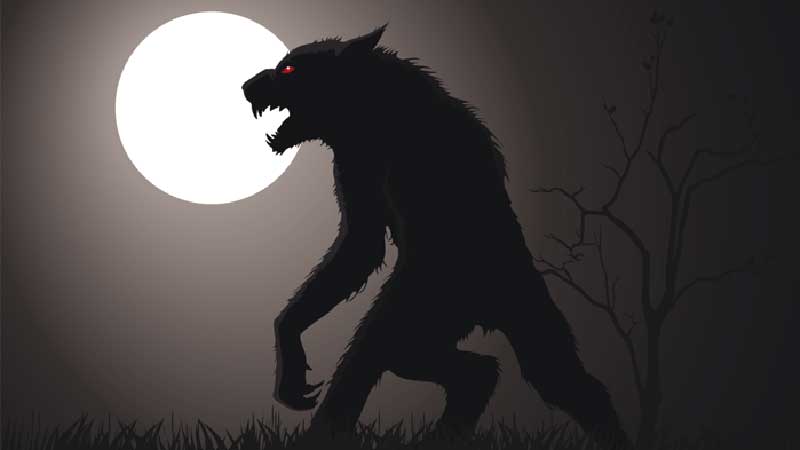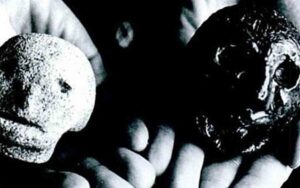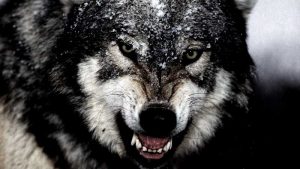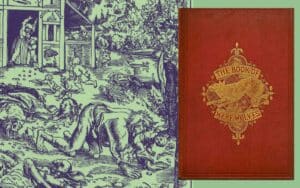ANDREW GARVEY pre-empts the Christmas season with a tale of a Yuletide Werewolf!

It’s that time of year again. The pre-pre-pre-Christmas countdown is on. Yes, the actual festivities may be weeks and weeks away but if the shops are already hawking Christmas tat and the pubs and restaurants are booking up Christmas meals, well, that’s good enough for me.
So, yes, it’s Christmas! Nearly.
And in Britain, we owe many of our Christmas traditions to the Victorians. And the final, joyous feast at the end of Charles Dickens’ 1843 classic A Christmas Carol, with all it’s redemptive happiness and a whacking great turkey, remains a deep-rooted image of a ‘proper’ Christmas.
Victorian newspapers delighted, every late December, in printing articles that celebrated and described our Christmas traditions. The Huddersfield Chronicle’s Boxing Day edition of 1863 explored some of the more ‘unusual’ traditions and folklore surrounding the celebrations.
Psalms and Suchlike
The un-named author begins by noting that carols evolved from Psalms and then, our correspondent’s thoughts turn towards the slightly more alternative…
“The Goths used to sacrifice a boar, for this animal, like the horse among the Persians, was, according to their mythology, sacred to the sun. It is customary among the peasants in the northern parts of the continent to make bread during Christmas in the form of a boar pig… exposing it, as a good omen, during the whole of the feast. Our Christmas pies were formerly made in this form, until they degenerated to the lugubrious shape of a coffin.”
Coffins aren’t Christmassy! Are they?
Christmas Evil
There’s more from our cheerful friend. “… in some places, candles were made of a particular kind, because the candle that was lighted on Christmas-day was required to… burn from the time of its ignition to the close of the day, otherwise it portended evil to the family for the ensuing year.”
Evil portents aren’t Christmassy, surely?
Mistletoe absolutely is, though. You can’t get more Christmassy than mistletoe and our author notes it’s a “relic of Druidism… was venerated publicly by the Celts and the Goths, when the sun approached the winter solstice.”
Fair enough. But then, and this is worth quoting extensively, our man at the Huddersfield Chronicle (sexist possibly, but I’m going to assume it was a man) launches into one of those Christmas traditions his should be reminded of as they tuck into their turkey leftovers.
Man is Drunken Wolf to Man
“There was a very old and established superstition respecting the mutation of men into wolves at this season, who were called were-wolves…. belief that there occurred a huge gathering of wolves which had been changed from men, and which, during Christmas night raged with such fierceness against mankind and other creatures, -not fierce by nature, that the inhabitants of the country suffered more hurt from them than they ever did from natural wolves.”
“For, said Olaus Magnus, in his ‘History of the Goths’, these human wolves attack houses, break down the doors in order to destroy the inmates, and descend into the cellars where they drink out whole tuns of beer and mead, leaving the empty vessels heaped one upon another.”
Magnus, our writer tells us also notes that “’If any man afterwards comes to the place where they have met, and his cart overturn, or he fall down in the snow, it is believed that he will die that year.’”
The were-wolf “transformation was probably not a disease, but a free and voluntary act, in the opinion of our ancestors.”
Take that Hollywood and all your reluctant, tragic and conflicted werewolves. Anyway back to 1863…
“The Saxons applied the name of were-wolf to the devil. A law of Canute having stated that the devil was ever on the watch to seize upon human souls, proceeds to recommend his bishops and priests to protect and defend their godly herds with the doctrine of wisdom, lest the raging ‘were-wolf’ tear them in pieces.”
And with that, we wish you a Merry Christmas. When it actually arrives, that is.






